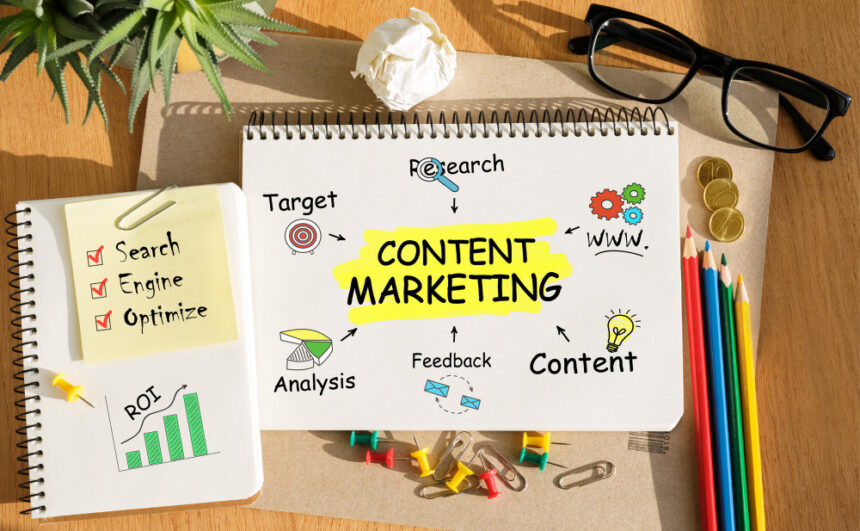Introduction: Why Content Marketing Matters Now More Than Ever
As we move further into the digital age, businesses across industries are increasingly relying on innovative marketing strategies to capture the attention of potential customers. Among these strategies, content marketing has emerged as a dominant force transforming how brands interact with audiences, build trust, and drive conversions. In 2025, content marketing is not just a buzzword; it’s a critical component of a business’s growth engine. With the internet more crowded than ever, companies must adapt to stand out, and content marketing offers the best path to long-term visibility and credibility.
In this comprehensive guide, you’ll learn everything you need to know about attracting and retaining customers through smart, strategic content marketing in 2025. From understanding evolving consumer behavior to implementing cutting-edge tactics, we’ll explore how you can turn your content into a powerful magnet for your ideal audience.
The Evolution of Content Marketing: A Quick Look Back
Content marketing has come a long way since the early days of blogging and email newsletters. In the past, simply posting articles with a few keywords was often enough to generate decent traffic. However, the landscape has shifted dramatically. Today, audiences are more discerning, search engine algorithms are more sophisticated, and the demand for high-quality, value-driven content has skyrocketed.
By 2025, content marketing is no longer optional—it’s essential. Businesses that fail to invest in quality content are often left behind in the digital dust. With AI-generated content, hyper-personalized experiences, and omnichannel engagement becoming the norm, marketers must think strategically about every piece of content they publish. Content marketing in 2025 is about storytelling, relevance, trust, and authenticity. More than just writing blog posts, it’s about delivering the right message to the right person at the right time.
Understanding Your Audience: The First Step Toward Success
Before you even begin creating content, it’s vital to understand who your ideal customers are. The best content marketing strategies begin with detailed customer research. In 2025, customer expectations are higher than ever. People want personalized, relevant content that speaks directly to their needs and interests.
Start by identifying your target audience’s demographics, interests, challenges, and behavior patterns. Use analytics tools, customer feedback, and social media insights to build detailed buyer personas. When you know who you’re speaking to, it’s much easier to create content that resonates and inspires action.
For instance, if you’re targeting young professionals in the tech industry, your content should reflect their lifestyle, interests, and communication preferences. On the other hand, if you’re aiming to reach retirees interested in travel, your content must be more relaxed, informative, and tailored to their unique goals.
Crafting a Strategic Content Plan for 2025
One of the biggest mistakes businesses make is publishing content without a clear strategy. In 2025, content marketing is all about planning. You need a roadmap that outlines your goals, key topics, publishing schedule, and distribution channels. Without this structure, your content may get lost in the noise.
Start by defining your objectives. Are you trying to drive traffic, generate leads, build brand awareness, or increase customer loyalty? Each goal will require a different approach. Once your goals are clear, focus on selecting content themes that align with both your business objectives and your audience’s interests.
A strong content plan should also include a mix of content types. Long-form articles, case studies, video content, podcasts, infographics, and social media posts can all play a role in your overall strategy. By diversifying your content, you cater to different learning styles and increase your chances of engaging a broader audience.
Creating High-Quality Content That Converts
It’s not enough to produce content—you need to produce great content. In 2025, quality trumps quantity. Search engines prioritize content that is useful, engaging, and authoritative. Your goal should be to create content that not only captures attention but also drives meaningful results for your business.
Start each piece with a compelling headline that draws the reader in. The headline is your first impression, and it must spark curiosity. From there, focus on delivering value throughout the body of the content. Answer your audience’s most pressing questions, provide unique insights, and include data or expert opinions where relevant.
Don’t forget about structure. Use subheadings, short paragraphs, and simple language to make your content easy to scan. Readers in 2025 are busy and distracted—they won’t wade through walls of text to find what they need. Keep things clear, concise, and impactful.
Leveraging SEO for Maximum Visibility

Search Engine Optimization (SEO) remains a cornerstone of content marketing success in 2025. While the algorithms have evolved, the goal remains the same: to help users find the most relevant, valuable information as quickly as possible. That’s why understanding how to optimize your content for search is essential.
Begin by conducting keyword research. Identify the terms your audience is searching for and integrate them naturally into your content. However, avoid keyword stuffing—it’s about context, not repetition. Include keywords in your title, meta description, headers, and body content in a way that feels organic.
Technical SEO also plays a crucial role. Make sure your website loads quickly, is mobile-friendly, and has a logical structure. Broken links, slow pages, and poor user experience can all hurt your rankings. In 2025, SEO is as much about user satisfaction as it is about keywords.
The Role of AI in Modern Content Marketing
Artificial Intelligence is revolutionizing content marketing in 2025. From writing assistance to predictive analytics, AI tools can help marketers streamline their workflows, personalize content, and make smarter decisions. If you’re not leveraging AI in some capacity, you’re missing out on a major advantage.
AI can assist in generating ideas, identifying trending topics, and even writing first drafts. Tools like ChatGPT, Jasper, and Copy.ai are widely used to speed up content creation. Meanwhile, analytics platforms powered by AI can reveal patterns in customer behavior, allowing you to tailor your content accordingly.
However, AI should be used as a helper not a replacement for human creativity. The best content still requires a human touch, especially when it comes to tone, emotion, and storytelling. Use AI to enhance your content marketing efforts, but always infuse your unique voice and perspective.
Building Authority Through Thought Leadership
One of the most effective ways to attract and retain customers is by establishing your brand as a thought leader in your industry. In 2025, trust is a currency—and content marketing is how you earn it. People are more likely to buy from brands they perceive as experts and leaders.
Thought leadership content can take many forms: in-depth guides, opinion pieces, interviews, case studies, or industry predictions. The key is to offer insights that go beyond the surface. Don’t just rehash what everyone else is saying—provide original thoughts, experiences, and expertise.
When you consistently publish high-quality thought leadership content, you build credibility. Over time, customers will come to view your brand as a trusted source of knowledge, which translates to higher engagement, more shares, and increased conversions.
Social Media and Content Distribution: Expanding Your Reach
Creating great content is only half the battle. To attract customers, you must ensure your content is seen. In 2025, social media remains one of the most powerful distribution channels for content marketing. Platforms like Instagram, LinkedIn, TikTok, and Facebook allow you to reach audiences in real-time, foster community, and amplify your message.
Each platform has its own best practices, so it’s important to tailor your content accordingly. For example, LinkedIn is ideal for professional and B2B content, while Instagram is better suited for visual storytelling. TikTok continues to dominate short-form video, making it a great choice for quick tips and behind-the-scenes content.
Consistency is key. Develop a regular posting schedule and engage with your followers. Respond to comments, ask questions, and participate in conversations. The more active and authentic you are, the more likely your content will spread organically.
Email Marketing: Nurturing Leads with Personalized Content
While social media gets a lot of attention, email marketing remains one of the most effective ways to nurture leads and drive conversions. In 2025, personalized, content-driven email campaigns are essential to any content marketing strategy.
The key to successful email marketing is segmentation. Instead of sending the same message to your entire list, divide your audience based on their behavior, interests, and stage in the customer journey. Then, tailor your content to meet their specific needs.
Email is also a great way to share your latest blog posts, promote exclusive offers, and deliver value-packed newsletters. Use your emails to build relationships, not just push sales. When done right, email marketing can deliver one of the highest ROI rates in the digital marketing toolkit.
Measuring Your Content Marketing Success
In 2025, data is your best friend. To refine your content marketing strategy, you need to measure what’s working—and what’s not. Thankfully, there are countless analytics tools available to help you track performance.
Start by monitoring key metrics like website traffic, time on page, bounce rate, social shares, and conversion rates. These numbers will give you insight into how your audience is engaging with your content. If a particular topic or format performs well, double down on it. If something falls flat, analyze why and make improvements.
Content marketing is not a one-size-fits-all endeavor. It requires ongoing testing, learning, and adjusting. The more data you gather, the better your strategy will become over time.
The Future of Content Marketing: What Lies Ahead
Looking forward, the future of content marketing is both exciting and challenging. Emerging technologies, shifting consumer behavior, and increased competition mean marketers must stay on their toes. However, one thing remains constant: content is still king.
Expect to see continued growth in video content, immersive experiences like AR/VR, and ultra-personalized content streams. Voice search, smart devices, and decentralized platforms will also reshape how audiences discover and consume content.
But no matter how the tools evolve, the foundation of successful content marketing will remain the same: understanding your audience, delivering value, and building trust. Brands that stay focused on these principles will thrive in 2025 and beyond.
Final Thoughts: Taking Action on Your Content Strategy
If you’ve made it this far, you’re already ahead of the game. You understand that content marketing in 2025 is a powerful tool—not just for visibility, but for building lasting customer relationships. The next step is to take action.
Start small if needed, but stay consistent. Develop a clear plan, create content with purpose, optimize for search, and never lose sight of the human beings on the other side of the screen. Remember, every piece of content is an opportunity to connect, influence, and convert.
As competition grows and technology evolves, those who invest in strategic, meaningful content marketing will be the ones who win. Your customers are searching. Make sure they find you.

